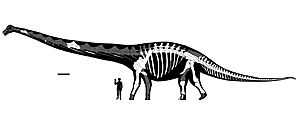Dreadnoughtus facts for kids
Quick facts for kids Dreadnoughtus |
|
|---|---|
 |
|
| Skeletal restoration showing known elements | |
| Scientific classification |
|
| Kingdom: | Animalia |
| Phylum: | Chordata |
| Clade: | Dinosauria |
| Clade: | Saurischia |
| Suborder: | †Sauropodomorpha |
| Clade: | †Sauropoda |
| Clade: | †Titanosauria |
| Clade: | †Lithostrotia |
| Genus: | †Dreadnoughtus Lacovara et al., 2014 |
| Species: |
†D. schrani
|
| Binomial name | |
| †Dreadnoughtus schrani Lacovara et al., 2014
|
|
| Script error: The function "autoWithCaption" does not exist. | |
Script error: No such module "Check for conflicting parameters".
Dreadnoughtus is a type of giant dinosaur called a titanosaur. Its name means "fears nothing," which fits because it was incredibly huge! Scientists found its fossilized skeleton in Argentina. These rocks show that Dreadnoughtus lived about 84 to 66 million years ago. This was during the Upper Cretaceous period.
Dreadnoughtus is one of the biggest land animals ever found. It might even be the heaviest land animal that scientists have ever calculated. They figure out its mass (or weight) by measuring its leg bones.
The skeleton of Dreadnoughtus schrani is very special. It is the most complete skeleton ever found for such a large titanosaur dinosaur. This means scientists found many of its bones. Out of about 256 bones in its whole body, they found 116. This makes the skeleton about 45% complete. If you only count the bones not including the skull, it's almost 59% complete!
Scientists also think this Dreadnoughtus was still growing when it died. They looked at its humerus (upper arm bone) using a method called histology. This showed that the bone was still forming quickly. This means the dinosaur could have grown even bigger if it had lived longer!
Contents
How Big Was Dreadnoughtus?
It's tricky to know the exact size and weight of dinosaurs that lived long ago. Scientists make educated guesses, which they call "estimates." These estimates are never perfectly exact because we don't have all the information. It's like making a really good guess when you don't have all the pieces of a puzzle.
Different scientists might come up with different estimates for the same dinosaur. This is normal because they use different ways to calculate. For Dreadnoughtus, its weight has been estimated in a few ways:
- Around 59.3 metric tons (which is about 65.4 short tons, or 59,291 kilograms).
- Between 35 and 40 metric tons (39 to 44 short tons).
- About 30 metric tons (33 short tons), if its body was 20% shorter.
As you can see, the heaviest and lightest estimates are very different. This shows how hard it is to be exact when estimating the size of extinct animals.
Dreadnoughtus Dimensions
Here are some of the estimated measurements for Dreadnoughtus:
| Dimension | metric | imperial |
|---|---|---|
| Mass | 59,300 kilograms (59.3 t) | 65.4 short tons (130,800 lb) |
| Total length | 26 m | 85 ft |
| Head and neck length | 12.2 m | 40 ft |
| Neck-only length | 11.3 m | 37 ft |
| Torso and hip length | 5.1 m | 17 ft |
| Tail length | 8.7 m | 29 ft |
| Shoulder height | ~ 2 stories (6 m) | ~ 2 stories (20 ft) |
Comparing Dreadnoughtus to Other Dinosaurs
To give you an idea of how big Dreadnoughtus was, here's how its estimated weight compares to some other well-known sauropod dinosaurs:
| Sauropod | Group | metric tons | short tons |
|---|---|---|---|
| Dreadnoughtus schrani | Titanosauria | 59.3 | 65.4 |
| Brachiosaurus altithorax | Brachiosauridae | 56.3 | 62.1 |
| Turiasaurus riodevensis | Turiasauria | 50.9 | 56.1 |
| Elaltitan lilloi | Titanosauria | 42.8 | 47.2 |
| Futalognkosaurus dukei | Titanosauria | 38.1 | 42 |
| Giraffatitan brancai | Brachiosauridae | 34 | 37.5 |
| Diplodocus longus | Diplodocidae | 14.8 | 16.3 |
Images for kids
-
Paleontologist Kenneth Lacovara in Patagonia with the Dreadnoughtus femur (thighbone)
See also
 In Spanish: Dreadnoughtus schrani para niños
In Spanish: Dreadnoughtus schrani para niños
 | Frances Mary Albrier |
 | Whitney Young |
 | Muhammad Ali |




